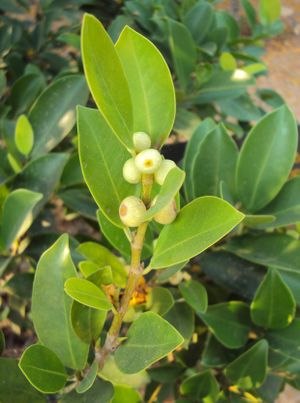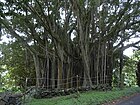Note: This is a project under development. The articles on this wiki are just being initiated and broadly incomplete. You can Help creating new pages.
Difference between revisions of "Ficus microcarpa - Laurel"
(→Chemical Composition) |
(→Commonly seen growing in areas) |
||
| Line 57: | Line 57: | ||
==Commonly seen growing in areas== | ==Commonly seen growing in areas== | ||
| − | {{Commonly seen|Grows in widely varying locations}}, {{Commonly seen| | + | {{Commonly seen|Grows in widely varying locations}}, {{Commonly seen|Limestone hills}}, {{Commonly seen|Montane forest}}. |
==Photo Gallery== | ==Photo Gallery== | ||
Revision as of 14:26, 18 February 2019
Ficus microcarpa is a banyan native in the range from Sri Lanka to India, southern People's Republic of China, the Malay Archipelago, the Ryukyu Islands, Australia, and New Caledonia.
Contents
- 1 Uses
- 2 Parts Used
- 3 Chemical Composition
- 4 Common names
- 5 Properties
- 6 Habit
- 7 Identification
- 8 List of Ayurvedic medicine in which the herb is used
- 9 Where to get the saplings
- 10 Mode of Propagation
- 11 How to plant/cultivate
- 12 Commonly seen growing in areas
- 13 Photo Gallery
- 14 References
- 15 External Links
Uses
Wounds, Ulcers, Bruises, Flatulent colic, Hepatopathy, Dysentery, Diabetes, Hyperdipsia, Burning sensation
Parts Used
Chemical Composition
Hydroxypentracosanoylamino]- heptadecane triol, ursa-dien-3alpha-ol, epifriedelanol, alpha-amyrin acetate, beta-sitosterol, beta-daucosterol, hexacosanoic acid, heneicosanoic acid[1]
Common names
| Language | Common name |
|---|---|
| Kannada | Peeladamara |
| Hindi | Kamarup |
| Malayalam | Itti, Kallithi |
| Tamil | Kallichchi |
| Telugu | Plaksa |
| Marathi | NA |
| Gujarathi | NA |
| Punjabi | NA |
| Kashmiri | NA |
| Sanskrit | |
| English | Laurel Fig, Chinese Banyan |
Properties
Reference: Dravya - Substance, Rasa - Taste, Guna - Qualities, Veerya - Potency, Vipaka - Post-digesion effect, Karma - Pharmacological activity, Prabhava - Therepeutics.
Dravya
Rasa
Kashaya (Astringent)
Guna
Ruksha (Dry), Guru (heavy)
Veerya
Sheeta (Cold)
Vipaka
Katu (Pungent)
Karma
Kapha, Pitta
Prabhava
Habit
Identification
Leaf
| Kind | Shape | Feature |
|---|---|---|
| Simple | alternate | Leathery, deep glossy green, oval-elliptic to diamond-shaped |
Flower
| Type | Size | Color and composition | Stamen | More information |
|---|---|---|---|---|
| Unisexual | 2-4cm long | Yellow | 5-20 | Flowers Season is June - August |
Fruit
| Type | Size | Mass | Appearance | Seeds | More information |
|---|---|---|---|---|---|
| tiny | 1 cm in diameter | specialized receptacle that develops into a multiple fruit | With hooked hairs | many | {{{6}}} |
Other features
List of Ayurvedic medicine in which the herb is used
- Vishatinduka Taila as root juice extract
Where to get the saplings
Mode of Propagation
How to plant/cultivate
Succeeds in full sun to partial shade. Prefers a moist, fertile soil[3]
Commonly seen growing in areas
Grows in widely varying locations, Limestone hills, Montane forest.
Photo Gallery
References
External Links
- Ayurvedic Herbs known to be helpful to treat Wounds
- Ayurvedic Herbs known to be helpful to treat Ulcers
- Ayurvedic Herbs known to be helpful to treat Bruises
- Ayurvedic Herbs known to be helpful to treat Flatulent colic
- Ayurvedic Herbs known to be helpful to treat Hepatopathy
- Ayurvedic Herbs known to be helpful to treat Dysentery
- Ayurvedic Herbs known to be helpful to treat Diabetes
- Ayurvedic Herbs known to be helpful to treat Hyperdipsia
- Ayurvedic Herbs known to be helpful to treat Burning sensation
- Herbs with Leaves used in medicine
- Herbs with Bark used in medicine
- Herbs with common name in Kannada
- Herbs with common name in Hindi
- Herbs with common name in Malayalam
- Herbs with common name in Tamil
- Herbs with common name in Telugu
- Herbs with common name in English
- Habit - Tree
- Index of Plants which can be propagated by Seeds
- Index of Plants which can be propagated by Cuttings
- Herbs that are commonly seen in the region of Grows in widely varying locations
- Herbs that are commonly seen in the region of Limestone hills
- Herbs that are commonly seen in the region of Montane forest
- Herbs




